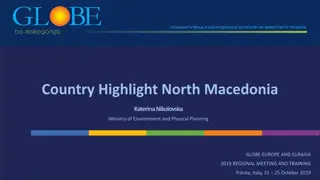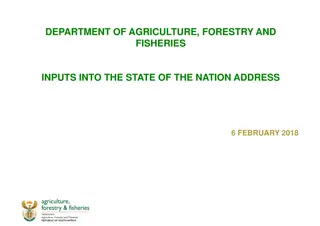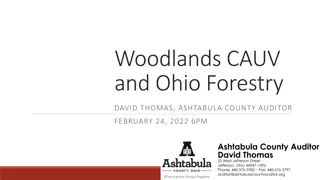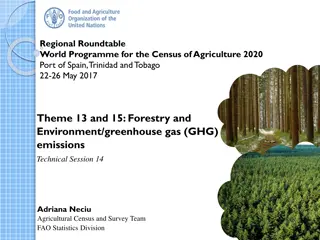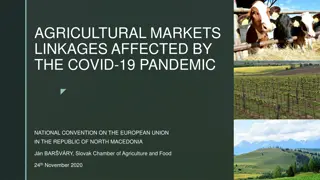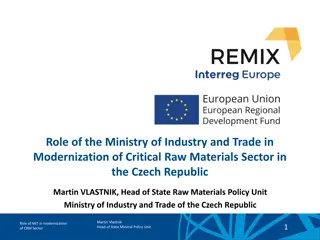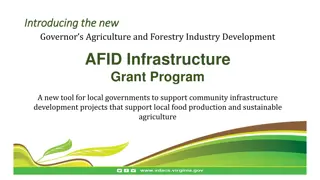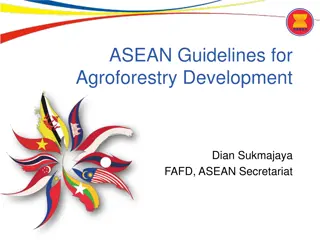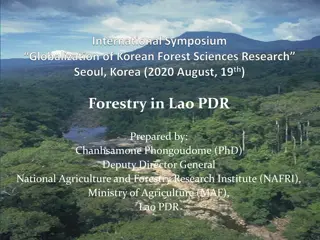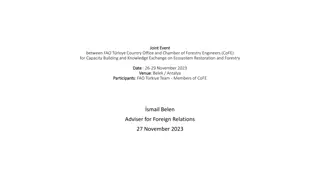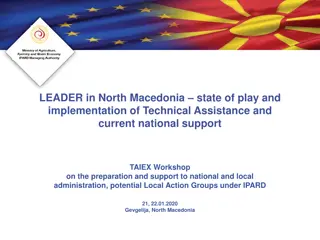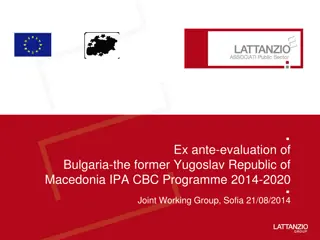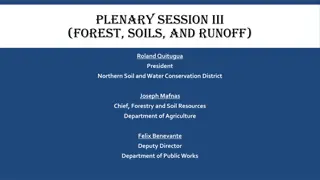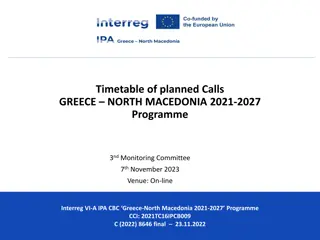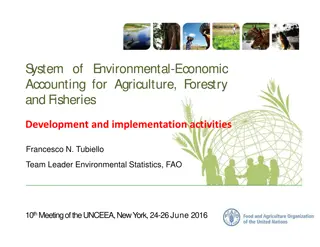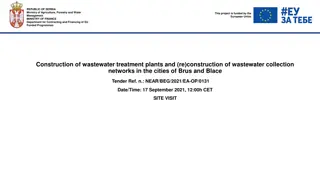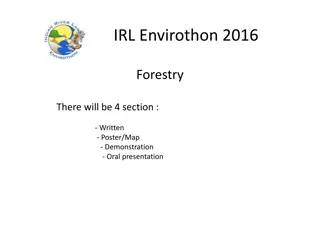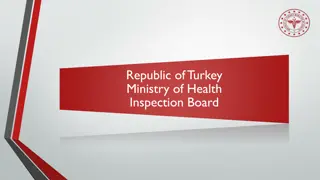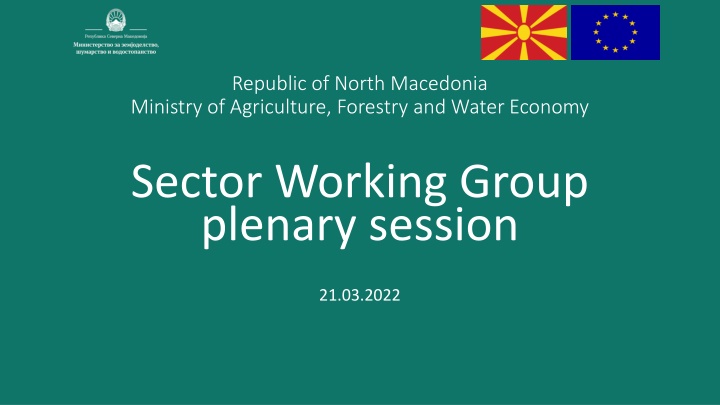
Republic of North Macedonia Ministry of Agriculture and Forestry Sector Plenary Session
The Republic of North Macedonia Ministry of Agriculture, Forestry, and Water Economy Sector recently held a plenary session to discuss key areas such as rural development, agricultural policy analysis, common organization of markets, fruit growing, land consolidation, organic agricultural production, and more. The session also highlighted national priorities for 2021-2027, short-term goals, and the establishment of an Agricultural Knowledge and Information System (AKIS) to enhance the country's agricultural sector.
Download Presentation

Please find below an Image/Link to download the presentation.
The content on the website is provided AS IS for your information and personal use only. It may not be sold, licensed, or shared on other websites without obtaining consent from the author. If you encounter any issues during the download, it is possible that the publisher has removed the file from their server.
You are allowed to download the files provided on this website for personal or commercial use, subject to the condition that they are used lawfully. All files are the property of their respective owners.
The content on the website is provided AS IS for your information and personal use only. It may not be sold, licensed, or shared on other websites without obtaining consent from the author.
E N D
Presentation Transcript
Republic of North Macedonia Ministry of Agriculture, Forestry and Water Economy Sector Working Group plenary session 21.03.2022
Department for Rural Development Goce Georgievski; Department for agricultural policy analysis Vase Simovska Boskova; CMO Common organization of the markets in agricultural products Igor Despotovski; Department of fruit growing, viticulture and wine production Borce Jonovski; National Land Consolidation Programme Kiril Georgievski; Organic Agricultural Production Valentina Miteva; Forestry and Hunting Department MAFWE Sasa Jovanovic; Administration for Water Economy -Bojan Durnev; Phytosanitary System- Nadica Dzerkovska; Priorities in the area of food safety and veterinary policy- Svetlana Tomeska Mickova.
Department for Rural Development
NARDS 2021-2027 National Priorities: 1. Establishment of financial instruments and risk management 2. Improvement of physical assets 3. Improvement of the Knowledge-transfer system 4. Adaptation to the effects of climate change 5. Technological advancement and modernization of agricultural production and processing 6. Value chain development and logistical support 7. Environment protection and preservation of natural resources 8. Advancement of agriculture, natural and human resources in Areas with Natural Constraints 9. Diversification of the rural economy and preservation of cultural and natural heritage
Short term priorities: Development of an Action Plan for the new strategic period Drafting of new Primary and Secondary Legal Framework in accordance with NARDS 21-27
Department for Agricultural Policy Analysis
AGRICULTURAL KNOWLEDGE AND INFORMATION SYSTEM - AKIS Short term priority on Agriculture Policy as per NARDS 2021 - 2027: Establishment of an Agriculture Knowledge information System-AKIS for a modern and competitive food production, reducing dependence on imports of strategic agricultural products, reducing production costs and improving the quality of food. Main Features: Establishment of permanent cooperation among scientific and educational institutions, advisory services, business sector and MAFWE. Popularisation of practical application of modern practical knowledge and techniques, digitalization and proven technologies in agro-ecological production zones. Establishment of production organizations that apply modern techniques and technologies and transfer knowledge in rural areas. Realization period 3 years. Estimated value for this project proposal is 2 million euros.
The Sub-Sector Working Group (SSWG) Firstly established by Law for Agriculture and Rural Development in 2012 12 SSWGs in total: cereals, grape and wine, fruits, vegetables, flowers, seed an seedlings, tobacco, honey, meat, milk, laying hens and eggs and organic agriculture Roles and responsibilities : providing opinions and analysis in the area of common market organization, demand and supply, actively involved in the preparation of the ministry support programmes and development programmes as well as relevant legal acts, etc Proposal for support in accordance with NARDS 2021-2027 1. Diagnosis of products and producers 2. Demonstration trials 3. Organization of workshops for practical application of AgriculturaKnowledge and Innovation System (AKIS) Participants: members of SWG agriculture producers, processors, associations, producer groups trainers: experts from relevant sub-sectors from faculties, science institutions, business sector, National Extension Agency-NEA and IT sector Main goal: improving quality and marketing standards and competitiveness of agricultural production
CMO Common organization of the markets in agricultural products
CMO Current situation The organization of the agricultural markets in the Republic of North Macedonia are not regulated in a single regulation as is the case in the EU and Regulation (EU) No 1308/2013 of the European Parliament and of the Council of 17 December 2013 establishing a common organisation of the markets in agricultural products. Some parts of the CMO (insufficiently and partially) are regulated with national laws (Law on agriculture and rural development, Law on quality of agricultural products, Law on wine, Law on tobacco etc.)
Importance The need for proper regulation of the agricultural markets and their organization is of exceptional importance for the agricultural sector in North Macedonia because it will provide a legal basis for: establishing instruments for financial support in certain key agricultural sub-sectors; intervention in the agricultural markets in case of market disturbances; integration (horizontal and vertical) of stakeholders in the agricultural sector; establishing fair contractual relations in the trade with agri-food products; establishing healthy eating habits in children of school and preschool age; protection of consumers by establishing mandatory quality standards for certain categories of agricultural products; protection of the geographical and traditional names and character of Macedonian agrifood products and recipes measures for Agricultural export promotion, etc.
Relation with NARDS 2021 2027 Improving the competitiveness of the agricultural sector, economic sustainability and income of agricultural holdings SG 1. Supporting the sustainable income of agricultural holdings for their contribution to improving food security SG 2. Strengthening market orientation and increasing competitiveness, with a special focus on research, technology and digitalization SG 3. Improving the position of farmers in the value chain of agricultural products
Short term priorities: - Development of an Action Plan for introduction and implementation of CMO measures in North Macedonia (draft Action plan is proposed but not yet approved) - Drafting of new Primary and Secondary Legal Framework for CMO - Institutional set-up (new CMO department)Budget funds will be provided for the implementation of the CMO measures (first in certain priority subsectors) - Financial support for equipment and software (Ex: for introduction of the raw milk payment system according quality parameters and classes)
Department of fruit growing, viticulture and wine production
Background According to National Programme for Agriculture and Rural Development (NARDS) 2021-2027,it is stated that for proper monitoring and analysis of the situation and planning of future development and providing reliable data, it is necessary to establish an integrated sub- sector IT system in viticulture and wine production interoperable with others registers in the sector, which in addition to the basic data on primary production and processing (areas, varieties, method of cultivation, number of producers, volume production, etc.) will also contain data on production and stocks.
Short/medium term priority as per NARDS 2021 2027: to achieve compliance with the EU CMO for wine and increase and further improve the control capacity (Traceability of grape production, quality control system for wineries, etc.). Support is requested to: Develop an integrated system for the monitoring the grape and wine production Improve vineyard register according to the new EU requirements:
National Land Consolidation Programme
OBJECTIVES increase the competitiveness of the agricultural production, improve the living conditions in rural areas, provide sustainable use of natural resources. OVERVIEW Feasibility of Land Consolidation assessed in 14 project areas Fully finalized 2 land consolidation projects Area of around 3000 ha Around 2500 landowners and farmers
ADOPTED RE-ALLOTMENT PLANS Konce, Municipality of Konce in November 2019 Egri, Municipality of Bitola in January 2020 Dabjani, Municipality of Dolneni in January 2022 Trn, Municipality of Bitola in February 2022 CONSTRUCTED AGRICULTURAL INFRASTRUCTURE Egri, Municipality of Bitola in January 2022
PROJECTS WITH SECURED FUNDING: Dabjani, Municipality of Dolneni, Construction of agricultural infrastructure Trn, Municipality of Bitola, Construction of agricultural infrastructure Ciflik, Municipality of Chesinovo Obleshevo, Re-allotment planning, Construction of agricultural infrastructure FUNDING TO BE SECURED FOR 2023 Logovardi and Opticari in Municipality of Bitola; Spancevo and Sokolarci in Municipality of Cheshinovo-Obleshevo) Kozhle in Munucipality of Petrovec
PLANNED PROJECTS IN PIPELINE FOR 2022-2023 DONOR SUPPORT NEEDED Implementation of two multi purpose land consolidation projects in order to lower expropriation costs for public infrastructure while ensuring that agricultural production will not be interrupted; Implementation of seven land consolidation projects in region Radovish, accompanied with improvements in agricultural infrastructure
Organic Agricultural Production
Legal Framework in place: National Strategy for Agriculture and Rural Development 2021 2027 National Plan for organic production 2013 2020 Law on Organic Agricultural Production - Official gazette of the Republic of Macedonia, issue 146/09, 53/11, 149/15, 39/16 and 132/16 and Official gazette of the Republic of North Macedonia 150/21); harmonized with EU Regulations (EC) 834/2007, 28.06.2007 and (EC) 889/2008, 05.09.2008; dopted bylaws regulating the field of production, processing, labeling of organic products, authorization and certification, as well as control systems. Started activities for harmonization of the legal regulations in the field of organic production with the EU Regulation (EC) 848/2018, 30.05.2018;
Overview of the current situation in organic production The legislation, the competent body, the control bodies and the accreditation and certification system are established and functional Controls State Inspectorate for agriculture Food and Veterinary Agency Control and certification The expert control in the organic agricultural production is performed by a control / certification body authorized by the Ministry of Agriculture, Forestry and Water Economy to perform expert control in the organic agricultural production. The control system and certification of organic production is delegated to two control / certification bodies: Balkan Biosert Macedonia and Pro Cert Control and Certification OKS. PRO CERT Control and certification OKS www.procert.mk Balkan Biocert acedonia www.balkanbiocert.mk MKC EN ISO/IEC 17065: 2012 ccreditation IARM The complete control and supervision in the system of organic production is performed by the State Inspectorate for Agriculture (SIA) and the Food and Veterinary Agency (FVA). Also, every entity that applies for financial support in organic production is subject to control by the Agency for Financial Support in Agriculture and Rural Development (AFSARD). Authorization AFWE
Realized expert support: Twinning project for organic agricultural production and quality protection of agricultural products funded by IPA TAIB 2009, which lasted until November 2014. - in order to better harmonize the Law on Organic Agricultural Production with EU Regulations; The first Register of Organic Agricultural Producers is established within IME (Employment Market Enhancement Project) and the Swiss Foundation for Technical Cooperation as a basic database of all relevant data on organic agricultural production in the Republic of Macedonia, but it needs further development, for full functionality;
Current expert support: - The project Nordic Support for the Progress of Northern Macedonia, in cooperation with the Secretariat for European Affairs and the Ministry of Agriculture, Forestry and Water Economy, within the cooperation between the Republic of Croatia and the Republic of Northern Macedonia, workshop on: New legislation in the field of organic production in the EU - the new EU Regulation (EC) 848/2018
Short/medium term Priorities for Organic Farming: to increase the competitiveness of organic production in the Republic of North Macedonia for successful placement on domestic and foreign markets. Support is requested to: Establish an electronic system of databases of organic agricultural production, Training of farmers in primary production, use of protection products in organic production and Development of livestock organic production and obtaining final organic products (meat and dairy products).
Forestry and Hunting Department - MAFWE
Priorities Monitoring of forests for abiotic and biotic factors 1. Establish ForestEye - Forest fire protection by advanced intelligent video surveillance and early detection system solutions (primary for forest fires management, but also for detecting illegal activities, poachers, etc) 2. Establish ForMon - Intensive and permanent national monitoring system of forest ecosystems (in line with CLRTAP Convention/ICP Forest - Level I & II plots) 3. Support ForUM - Multiyear R&I and Pilot programme ensuring forest restoration and reinforced SFM for climate adaptation and forest resilience 4. Creating bridges establish a Government communication strategy on the importance of the conservation and SFM with implementation of an awareness rising campaign.
Priorities National Forest Inventory Prepare national level estimations and statistics based on harmonized definitions of forest related data, such as forest types, growing stock, forest uses, forest structure, etc but also biodiversity & climate change relevant data, among others
Administration for Water Economy
Main short/medium term priority in the Irrigation Sector: To increase the irrigated and drained area by investments in construction of new facilities and rehabilitation and reconstruction of the existing water management facilities Support is requested to: Prepare a study on the effects of climate change on irrigation and drainage including the changes in crop and irrigation water requirement, and water availability. Prepare a study for water losses in the open canals versus their replacements with pipes Prepare a study to introduce drip irrigation inside of each irrigation system
Support is requested to: Development of an action plans on: - Reduction of water use in irrigation systems; - Promotion and application of modern irrigation systems and practices; - De-risking by better water management (flood control, drainage management and insurance); - Increase on-farm water use efficiency and water productivity including the development of the irrigation scheduling system and promotion of fertigation; and - Improvement in preparation of the management plans for each of the irrigation and drainage systems.
The National Plant Protection Organisation is composed by the following Competent Authorities (CAs): Phytosanitary Directorate (PD) Directorate for Seed and Seedling Materials State Phytosanitary Laboratory (SPL) State Agriculture Inspectorate (SAI) Public authorized institutions - Universities, National Extension Agency (NEA)
Priorities Further approximation and implementation of the legislation in the plant protection area according to the Plan for approximation of the legislation in plant health and plant protection products, for the forthcoming 5 years Further development of Integrated Pest Management (IPM)
Priorities Upgraded, consolidated and efficient information systems PIS Strengthening the institutional capacities of CAs aiming to develop an efficient plant protection system Procurement of Technical equipment for DSSM, SPL, SAI, PD
Priorities in the area of food safety and veterinary policy Food and Veterinary Agency Svetlana Tomeska Mickova EU and International Cooperation Department
STRATEGIG DOCUMENTS Food safety strategy Animal by products strategy Animal welfare strategy Multiannual national control plan Action plan for gaining free status of Classical swine fever Action plan for categorization of dairy farms
ANIMAL HELTH Short term priority Improved official controls for AH Adopted and implemented EU AHL (in force April 2021) 50 implementing legal acts and repeals around 400 secondary legal acts Complete reconstruction of the current national legislation Established surveillance programs (42) and eradication programs (13) for priority animal diseases
Medium term priority Improved disease free status of animal diseases (CSF and Rabies) Improved export of food and products of animal origin in EU and worldwide
Food safety Specific objectives/outcomes 1. Creating a common platform for a coordinated and integrated approach, covering 3 areas: Food Safety, Food Defense and Food Security. Outcome:Effective, sustainable and resilient national food safety system is established 2. Strengthening institutional capacity Outcome: Comprehensive and enforceable legal framework. Official controls are carried out in an effective, efficient and reliable way, thus provide high level of protection of human, animal and plant live and health, as well as createfavorable business environment for food business operators .
Specific objectives/outcomes 3. Prevention and control of food fraud and serious food safety threats Outcome: Consumers have access to authentic, safe and nutritious food. 4. Strengthening the system of scientific support, professional expertise and record keeping Outcome: Provided scientific support, professional expertise and record keeping of FVA 'activities in the field of food safety including risk assessment (official risk-based controls) as well as creation of policies, programs and plans.
Specific objectives/outcomes 5. Strengthening communication, education and cooperation in the field of food safety Outcome: The high level of information, knowledge and commitment of the consumers and other stakeholders, with an established system of communication and cooperation are institutionalized and are one of the pillars of the national food safety system. 6. Food safety policy Outcome: Established framework and mechanisms for promoting nutrition that provides better health, ensures healthy lifestyle and welfare of the entire population
ANIMAL BY PRODUCTS The Strategy adopted by the Government of NM Proposes the most appropriate system for safe disposal of ABP processing with sterilization under pressure; Mid term priority Construction of Rendering plant-Requirement for accession into EU Initiated procedures for defining and establishing the ABP system (construction-technical specification, selection of technology etc.)
Current state of play with ABP Regulated with the Law on ABP and the relevant stipulating secondary legislation. ABP management is not in line with the national rules and relevant EU Regulations; System for safe disposal and usage of ABP is not in place; ABP from slaughterhouses, food industry and trade, farms -burial on landfill sites
Investment Costs taken from the fisibility study. The building could be smaller, however, there should be buffers for a possible expansion. (around 13 mil eur)
RISK ASSESSMENT Short term priority Reliable data collected Definition of exposure rates and calculation of potential risks in animals and food Analysis and follow up actions Risk based decision making process
Areas for support 2023-2024 Continuation of technical assistance in the area of: Animal health Food safety Animal by products Official controls Data collection, analysis and Risk assessment Equipping FVA and official control services Improved Information systems in the Food and Veterinary Agency
Thank you for your attention



